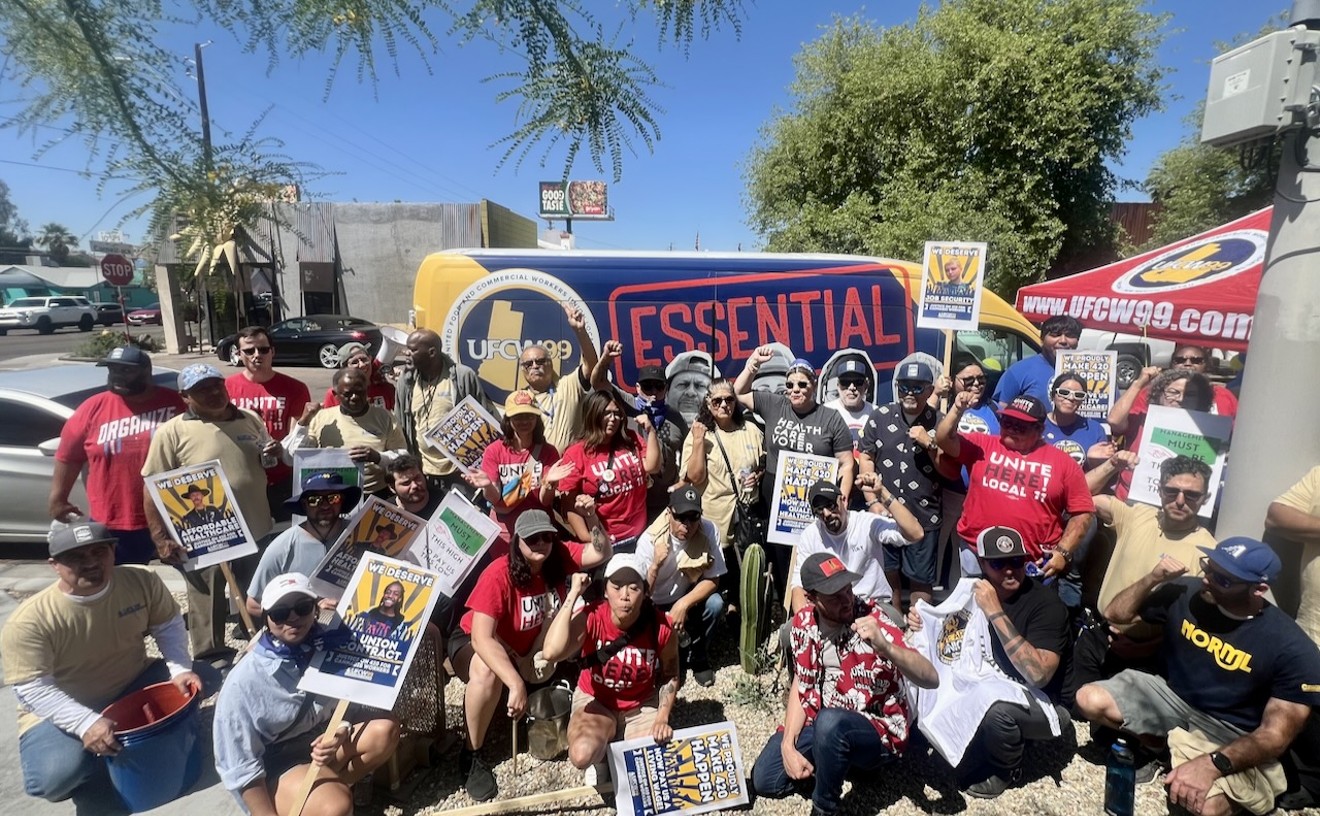Emmy-nominated actress Laverne Cox came to Phoenix to speak on behalf of Monica Jones, a transgender Phoenix student convicted on charges of manifesting prostitution in April.
Cox, Jones, and Jones' attorneys all claim that the Phoenix city ordinance under which Jones was arrested is unconstitutional and discriminatory. Jones' attorneys filed an appeal of her conviction this week.
See also: -Activists: Response to Transgender Woman's Rape in Detention Center Is Unacceptable -John Kavanagh Done Trying to Regulate Transgender Bathroom Use (For Now)
Jones, a social-work student at ASU, was arrested in May 2013 after accepting a ride to a local bar from an undercover police officer engaged in an anti-prostitution sting. She was charged under Phoenix Municipal Code Section 23-52(A)(3), "manifest[ing] an intent to commit or solicit an act of prostitution," or, plainly, "manifesting."
At trial, Jones claimed she had simply accepted the ride from a handsome stranger, hoping to possibly get drinks with him. But the officer said her behavior indicated that she was involved in prostitution. Jones has one prior misdemeanor prostitution conviction.
At a press conference held Tuesday at his office, Jones' attorney, Jean-Jacques 'J' Cabou, refused to let her answer any questions about her arrest, citing the pending litigation. "She was convicted of a crime she didn't commit, in trial that was unfair, under a law that shouldn't be a law at all," Cabou said.
In a press release, Jones' attorneys said the involved officer cited the arrest location--near Jones' home--as an area known for prostitution, and said at trial that her outfit, a tight black dress, suggested that she was manifesting.
In Jones' written appeal and at yesterday's briefing, Cabou, a partner at Perkins Coie, LLP, argued that Phoenix's manifesting law violates the First Amendment. "This law abridges a lot of pure speech," Cabou said. "Speech like speaking. Speech like asking questions. Speech like what you wear."
Cabou said the city ordinance is both too broad--sweeping in lots of protected activity--and too vague, failing to make clear what exactly constitutes a crime. In Jones' written appeal, Cabou claims that the ordinance could prohibit both overt gestures, like requesting the touching or exposure of breasts or genitals, and subtler, less illicit engagement, like involving a passerby in conversation or asking whether a person is a police officer.
"Is it impermissible to flirt with someone on the street or in a car? Sell coffee in a bathing suit in a place open to public view? Hail a cab? Wear a 'tight fitting black dress'? It is difficult to imagine how anyone on a Phoenix street (or in a car) would know if he or she were violating the Code," Cabou wrote. "It criminalizes ordinary people, doing ordinary things--things like walking a certain way and asking certain questions--which they cannot know are against the law."
Jones and her supporters argue that this law is especially troublesome for the transgender community, in particular for trans women of color. "If I was a white woman walking down in Arcadia, I would never have been stopped for manifestation," Jones said.
"The officer who arrested me profiled me as a sex worker because I am transgender, I am a woman of color and I live in an area that is perceived to be low income," Jones said in a press release.
The American Civil Liberties Union agrees that the law unfairly targets the transgender community. The organization filed a brief in support of Jones' appeal, arguing for her conviction to be overturned because of what it sees as the unconstitutionality of the local law. "Vague and overbroad laws, like Phoenix's manifesting ordinance, give too much discretion to police officers, encouraging biased policing against women of color, particularly transgender women of color, people living in poverty, and other members of the LGBT community," said Chase Strangio, a staff attorney with the ACLU's LGBT & AIDS Project, in a written statement.
At yesterday's conference, Strangio said Phoenix's ordinance is so broad as to permit officers "to arrest someone for literally any gesture," including the expression of gender. "The risk to vulnerable communities is too severe," Strangio said.
Jones' attorneys claim that her arresting officer referred to her as a man at least 20 times in his written report, as well as at trial. "Transgender women, especially transgender women of color, are too often perceived by law enforcement to be engaged in prostitution solely because of their transgender status," Strangio wrote.
Laverne Cox, a transgender woman and star of Netflix's hit series "Orange is the New Black," said she felt it was her duty to get involved in Jones' case and to speak out against the Phoenix ordinance. "Laws like this law systematically support the idea that girls like Monica and me are less than in this country," she said. Cox spoke of her own experience with profiling by police.
Dan Pochoda, the Legal Director of the ACLU's Arizona chapter, said laws like the vague Phoenix ordinance aren't uncommon. They are often passed as part of a generalized push by the business community to "clean up" neighborhoods by criminalizing prostitution and begging.
Cabou, Jones' attorney, said the Phoenix ordinance has been on the books for more than 20 years but has not been challenged in recent years, largely because most people in Jones' situation are encouraged to accept plea offers to avoid trial. "Monica is one of my very few clients who has had the courage to go to trial and defend herself," Cabou said.
Cox expressed disappointment that there hasn't been more outrage about Jones' plight. She said she first heard about Jones' case online around the time of the arrest, but she never expected Jones to be convicted. Cox recalled the very vocal national reaction against Arizona SB 1062, the controversial bill viewed as anti-gay by many and vetoed by Governor Jan Brewer in February. She expressed surprise that a similar reaction hasn't occurred in Jones' case. "I wonder: where are those organizations today?" Cox said. "I'm here today to encourage folks all over the country to stand with Monica Jones, and to call for overturning her conviction and this unconstitutional law. Where are you?"
Cox called Jones "the definition of a hero" for her willingness to fight against the law. She pointed to the disproportionate number of trans women who are filtered into the criminal justice system for similar charges. In many states--including Arizona--transgender women are placed in all-male lockup facilities.
Jones' attorney hopes to see the law under which she was convicted declared unconstitutional. And if that doesn't happen, he has also argued in Jones' appeal that several legal errors at her trial should lead to a reversal of her conviction.
Cabou said he expects the state to file a brief in response to the appeal, and he has requested the right to file a reply to that. Next, an oral argument will likely be scheduled before the judge issues a written decision in the case. Cabou said he expects all of this to take another month, at least.
At yesterday's conference, Jones spoke of the impact her arrest and conviction have had on her. "For someone to say that my truth, my story, is a lie, affected me so greatly," she said. Jones said the case has killed the little faith she had in the criminal justice system. But she is willing to carry the burden of fighting against the Phoenix ordinance on behalf of other trans women. "For me to sit here and take this one little burden I have to carry--many trans women before me carried a lot on their shoulders--this is my one little burden."
If her conviction is upheld, Jones will have to serve 30 days in jail and pay a $150 fine.
Got a tip? Send it to: Ashley Cusick.
Follow Valley Fever on Twitter at @ValleyFeverPHX.
Follow Ashley Cusick on Twitter at @AshleyBCusick.










